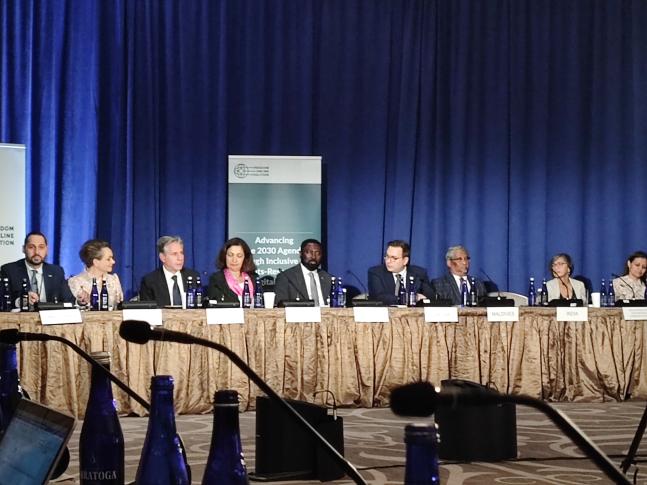
This statement was delivered on behalf of APC by APC Executive Director Chat Garcia Ramilo at a ministerial meeting convened by the Freedom Online Coalition (FOC), which brought together high-level representatives of FOC member states and other relevant stakeholders in New York on the margins of the 78th session of the United Nations General Assembly.
Esteemed ministers, colleagues,
Thank you for the opportunity to address you today. I speak on behalf of the Association for Progressive Communications (APC), an international civil society organisation with members from over 70 countries located mostly in the global South.
We are a network committed to co-creating a just and sustainable world by supporting people to use and shape the internet and digital technologies and ensure that they are developed and governed as a public good.
As we all know, digital technologies have a huge potential to advance and foster sustainable development and human rights. Nevertheless, business models rooted in surveillance and exploitation of people and their data have taken over, and digital technologies’ development and use have become rife with exclusion, misogyny and violence. Women, girls, LGBTQIA+ people and other historically marginalised groups, in particular, face persistent discrimination and violence in online contexts. Worldwide, we see increasing government control over digital technologies and the internet, often characterised by abusive use of legislation to silence and persecute, all while digital divides are widening.
To address this, we believe that digital policy should focus not only on technology, but on addressing the inequality and abuse of power created and worsened by these technologies and the policies that govern them. To this end, I want to propose the following:
-
First, we need to foster more robust and meaningful multistakeholder collaboration where those who are affected by digitalisation, particularly marginalised groups, have a voice in shaping policy at national, regional and international levels. For instance, APC recognises the Freedom Online Coalition (FOC), in which we actively participate as a member of its Advisory Network, as a valuable platform to advance this goal. The increasing emphasis on digital inclusion as a core component of the FOC mission is a step in the right direction and one where engagement with communities who are most affected is required.
-
Secondly, states need to hold tech companies to account for the harm they cause people and the environment. When states insist on companies doing human rights and environmental due diligence in a periodic and consultative manner, the harm they cause can be significantly mitigated. Due diligence needs to take account of the implications of companies' policies, products and services on freedom of expression and privacy, rights of users to be free from violence and to participate in public life, as well as their environmental impact. Meaningful engagement of vulnerable groups who might be adversely impacted by these policies and products is essential. Greater transparency is needed in companies' responses to violence in digital contexts.
-
Additionally, when crafting solutions to address abuse online, governments should reconsider restrictive regulatory options and avoid criminalisation that could lead to censorship and persecution. International human rights frameworks should be the basis for digital policy that seeks to address violence and digital exclusion while holding both governments and companies accountable. Specifically, we propose a gender intersectional approach when developing cybersecurity and cybercrime frameworks to mitigate inequalities and discrimination. In collaboration with others, we have developed a framework and an assessment tool that could be helpful for policy makers working on cybersecurity policies.
-
It is essential for the international community to ensure that private interests are aligned with public interests and a sustainable digital inclusion that serves as an equaliser and enabler of rights and justice.
-
Finally, it is crucial to strengthen global digital cooperation for universalising digital inclusion as a condition to responding to the persistent and emerging challenges in the digital age, including the environmental crisis. It is also crucial to reform policy and regulatory environments so they are favorable to the co-existence of different models for connectivity provision, including community networks and medium and small cooperative operators. As a global public resource, the internet has to be universal and affordable and its governance should be grounded in international human rights standards and public interest principles.
Thank you for your attention.